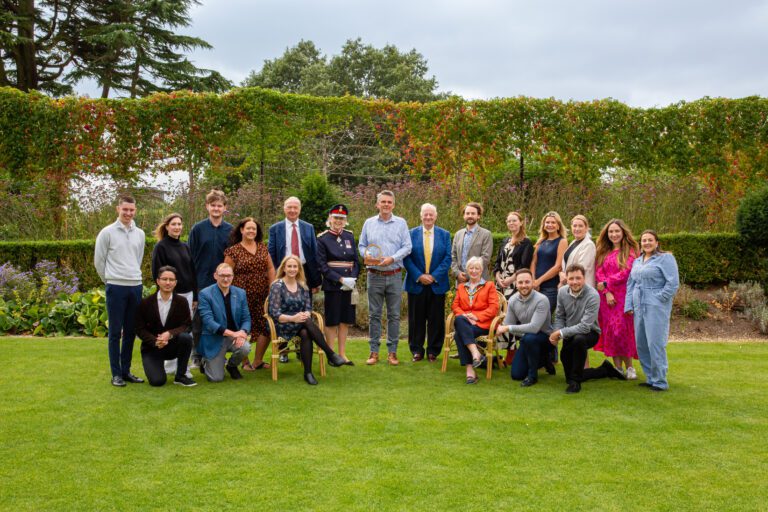Building digital brands with purpose


Last week saw Climbing Trees’ first foray into webinar hosting, ‘Building Digital Brands With Purpose.’ We were joined by an incredible expert line-up of speakers in Mal Chadwick from Greenpeace UK, Fleurie Forbes-Martin from Studio Republic, and Gavin Shinfield of Kyan.
Together we discussed how agencies and client-side marketers can put purpose front and centre in their communications.
You can watch the full 1:15hr session here or read on for an overview of the event highlights.
The role of marketing in driving change
The event kicked off with Alex Holliman, Climbing Trees MD explaining why marketers have a role to play in building purpose-driven businesses. “Firstly, marketing and communications are often the only connection the outside world has with businesses. As consumers are more enlightened than ever before they’re increasingly demanding ethical, purpose-driven businesses. So, it is our responsibility to tell these stories in an authentic way.”
Alex went on to explain, “marketers have more access to customers than ever before We are on the front line of understanding what makes them tick meaning marketers have more intelligence to feed into product and service development. We should therefore be making an impact on the operations of our businesses by putting the customer voice front and centre”.
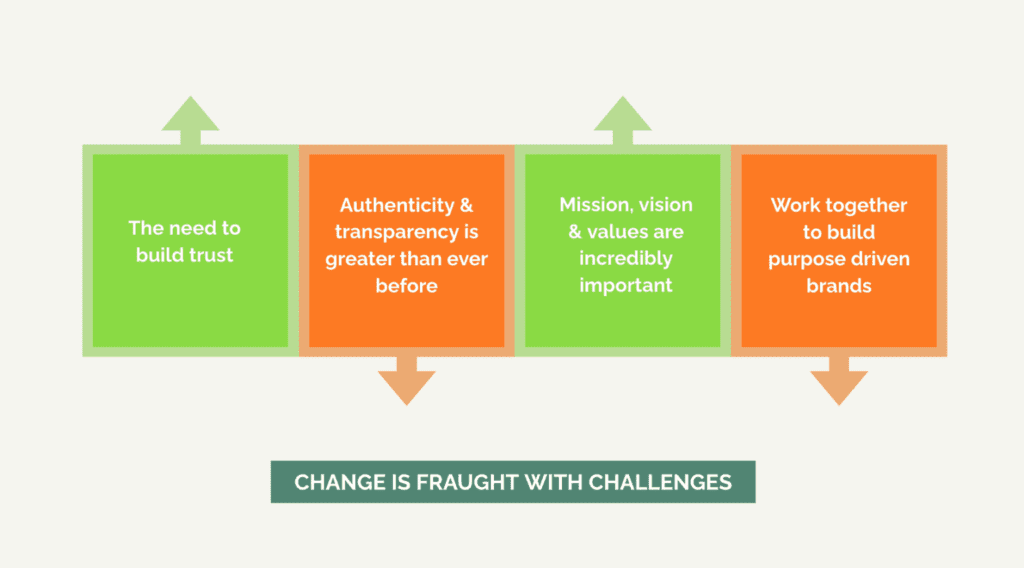
What the marketing industry thinks
With the importance of marketing’s role in driving purpose-driven brands set, Alex went on to reveal Climbing Trees initial research findings with 250 agency leaders and in-house marketers. The study set out to understand what marketers think about the need for purpose-driven communications and how the industry can best impact change.
While the full findings will be released in the coming weeks, some of the headlines included:
– Client-side marketers are driving change in the industry with 61% saying sustainability is important to their business and 88% referring to their sustainable credentials in their marketing. There is an opportunity for agencies to bring their sustainable credentials to the fore too with 57& of clients thinking it important for their agencies to be aligned with their own sustainability agenda.
– Educate agencies on the importance of accreditations. 28% of clients will only consider agencies with sustainable accreditations. Yet just 4% of agencies believe becoming a B-Corp and 6% becoming net-zero are important ways to drive sustainability. There is, therefore, work to be done to educate agency leaders on the value these accreditations have.
– Clients place an over-reliance on their agencies when it comes to driving sustainability with just 4% of clients saying they consider sustainability at every marketing touchpoint (versus 19% of agencies). In fact, 11% of client-side marketers don’t consider sustainability in their marketing at all.
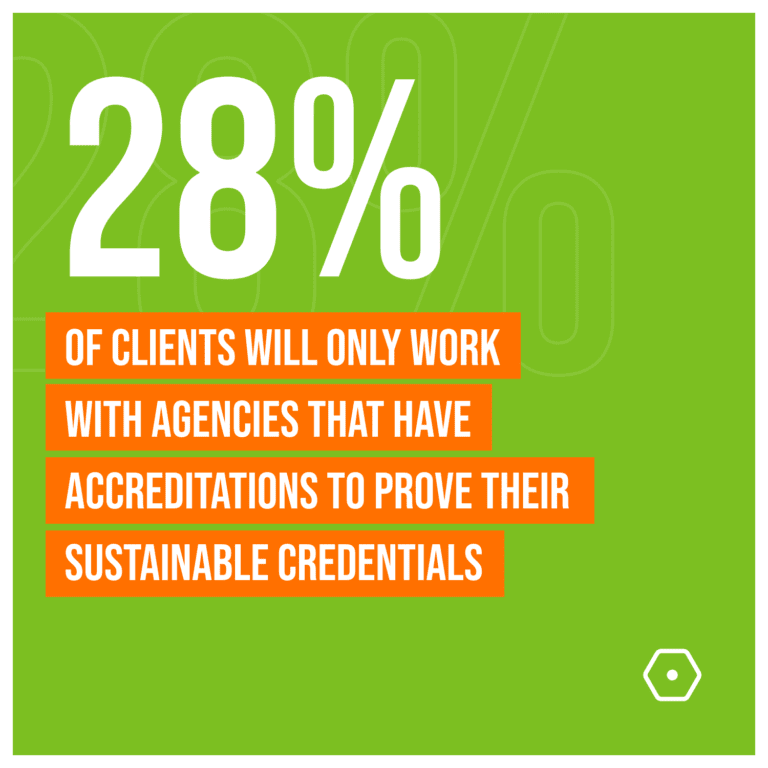
How the sustainability game changers do it
We then heard from Malachi Chadwick, Web Editor at Greenpeace UK who explained how the charity balances its sustainable marketing practices in line with its values and mission.
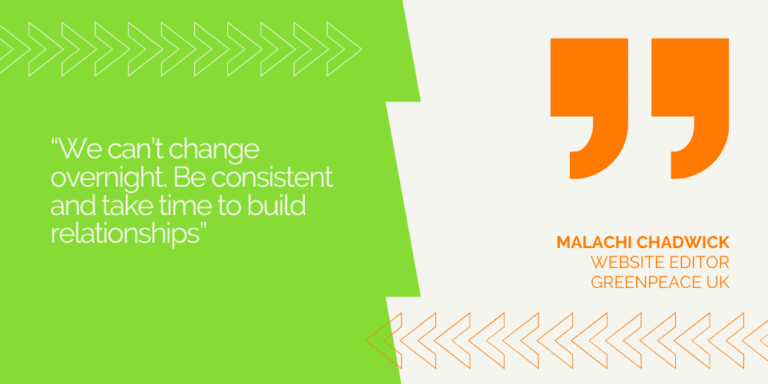
He took us through the six principles Greenpeace UK follow to ensure ethics and integrity in their communications.
- Framing
Decide who the characters are in each campaign. Ask yourself who your audience is, what values and assumptions are baked into your communications, who or what are you representing in this campaign? - Credit
Share the spotlight and respect the grassroots. Who has been working on this for years? Give them credit, a platform and make them the hero of your story. - Foundations
Hold people to account but also highlight the good people working within broken systems to create change. Foster scepticism, not cynicism. - Accessibility
Make sure your campaigns land will your entire audience. Be welcoming, not excluding. Think about accessibility in its broadest sense and create your comms with everyone in mind. - Representation
Tell others’ stories with integrity by building long-term relationships. Build a more diverse team, avoid tokenism, and pass the mic. - Pay It Forward
Treat your platforms and resources with sustainability in mind, make sure the incentives you use don’t drive individual content creators to do unethical things in the pursuit of ever-increasing engagement rates.
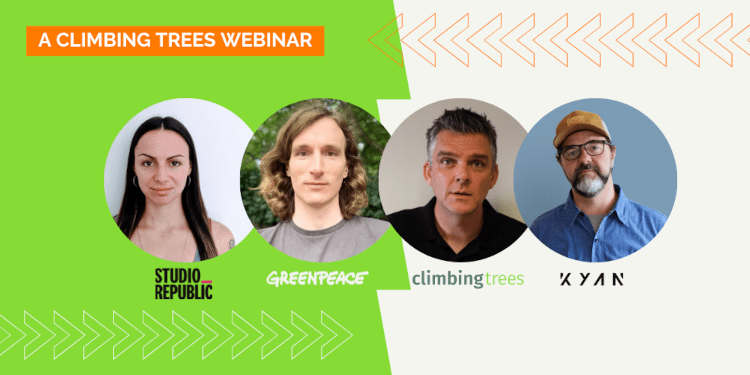
What did the experts have to say?
Fleurie Forbes-Martin Director of Growth at Studio Republic (read more from Fleurie on why the ‘tipping point for marketing is now.’) then took the helm to steer our expert panel discussion on building digital brands with purpose.
The team of agency leaders all heavily involved in creating purpose led businesses along with Mal from Greenpeace, discussed how agencies and brands alike can play their part in creating a sustainable future through their marketing.
“You can’t change direction overnight and position yourself as a perfect ethical being. Take the time to build relationships and trust with your users and audiences.”
Fleurie Forbes-Martin
Highlights from the discussion include:
- The difference between ethics and purpose.
The consensus being that acting ethically was about operating in an open, honest and transparent way. While purpose needed to go deeper and focus more on a particular driver or subject.
“If we accept something is wrong, then the ethical thing is to do something about it”
Alex Holliman
- Transparent and truthful.
The panel agreed that ensuring transparency in all communications both internal and external was key to building purpose-led brands and businesses. Admitting when you get it wrong is just as important as shouting about when you get it right. In fact, it can be a red flag if organisations only talk about their targets and not their plans on how to reach them.
“Having a transparency ethos is important as what gets measured, gets done”
Mal Chadwick
- Championing B Corp.
The panel were shocked at the low proportion of agency (4%) and brand (12%) marketers that thought becoming a B Corp was an important way to drive sustainable change. They agreed more education was needed in the sector about this accreditation for businesses to move to a place way they actively strive to make a positive impact on the world.
“We are not perfect. Acknowledge shortcomings as much as celebrating where we shine a light is important. Recognise the problems and actively strive for change”
Gavin Shinfield
Marrying ethics with reality.
A question from the audience prompted debate around the limited choices marketers have when it comes to digital platforms. Even alternative, ethical search engines like Ecosia use data from Bing and Google. Mal reminded us that this isn’t a new problem, questionable media outlets have always been a challenge for conscious communications professionals. And Alex suggested the big tech giants are all making strides towards becoming greener and more sustainable. Everyone agreed there is no perfect solution.
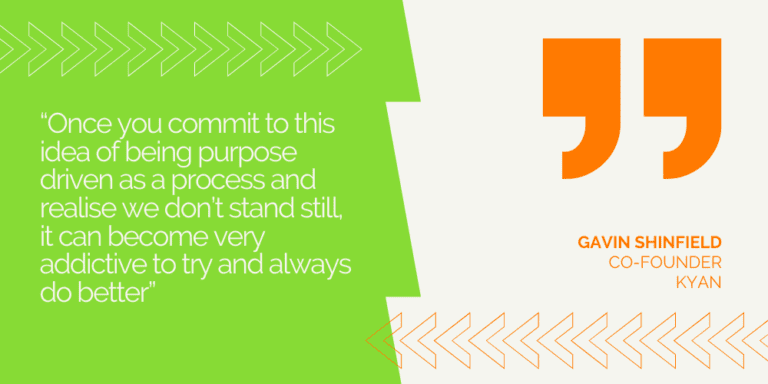
In summary, there is a lot the marketing industry can learn and do to make an impact with sustainable and ethical marketing. There’s no easy solution or quick fix, but a commitment to change and a willingness to learn is the best place to start.
Whether you joined us on the day or have viewed this content in retrospect, we hope it has struck a chord with you. If building ethical brands and marketing with purpose is on your agenda for 2022 and beyond, we would love to talk.


